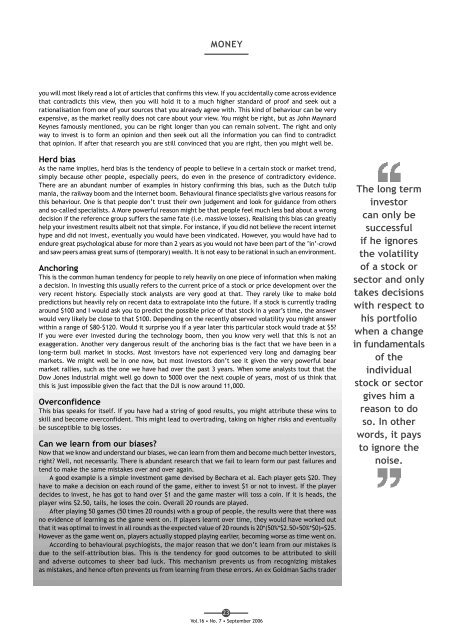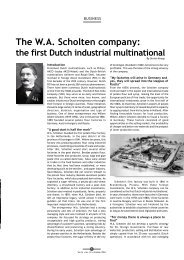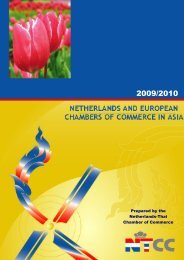Sept06 latest - Association of Dutch Businessmen
Sept06 latest - Association of Dutch Businessmen
Sept06 latest - Association of Dutch Businessmen
You also want an ePaper? Increase the reach of your titles
YUMPU automatically turns print PDFs into web optimized ePapers that Google loves.
MONEY<br />
you will most likely read a lot <strong>of</strong> articles that confirms this view. If you accidentally come across evidence<br />
that contradicts this view, then you will hold it to a much higher standard <strong>of</strong> pro<strong>of</strong> and seek out a<br />
rationalisation from one <strong>of</strong> your sources that you already agree with. This kind <strong>of</strong> behaviour can be very<br />
expensive, as the market really does not care about your view. You might be right, but as John Maynard<br />
Keynes famously mentioned, you can be right longer than you can remain solvent. The right and only<br />
way to invest is to form an opinion and then seek out all the information you can find to contradict<br />
that opinion. If after that research you are still convinced that you are right, then you might well be.<br />
Herd bias<br />
As the name implies, herd bias is the tendency <strong>of</strong> people to believe in a certain stock or market trend,<br />
simply because other people, especially peers, do even in the presence <strong>of</strong> contradictory evidence.<br />
There are an abundant number <strong>of</strong> examples in history confirming this bias, such as the <strong>Dutch</strong> tulip<br />
mania, the railway boom and the internet boom. Behavioural finance specialists give various reasons for<br />
this behaviour. One is that people don’t trust their own judgement and look for guidance from others<br />
and so-called specialists. A More powerful reason might be that people feel much less bad about a wrong<br />
decision if the reference group suffers the same fate (i.e. massive losses). Realising this bias can greatly<br />
help your investment results albeit not that simple. For instance, if you did not believe the recent internet<br />
hype and did not invest, eventually you would have been vindicated. However, you would have had to<br />
endure great psychological abuse for more than 2 years as you would not have been part <strong>of</strong> the ‘in’-crowd<br />
and saw peers amass great sums <strong>of</strong> (temporary) wealth. It is not easy to be rational in such an environment.<br />
Anchoring<br />
This is the common human tendency for people to rely heavily on one piece <strong>of</strong> information when making<br />
a decision. In investing this usually refers to the current price <strong>of</strong> a stock or price development over the<br />
very recent history. Especially stock analysts are very good at that. They rarely like to make bold<br />
predictions but heavily rely on recent data to extrapolate into the future. If a stock is currently trading<br />
around $100 and I would ask you to predict the possible price <strong>of</strong> that stock in a year’s time, the answer<br />
would very likely be close to that $100. Depending on the recently observed volatility you might answer<br />
within a range <strong>of</strong> $80-$120. Would it surprise you if a year later this particular stock would trade at $5?<br />
If you were ever invested during the technology boom, then you know very well that this is not an<br />
exaggeration. Another very dangerous result <strong>of</strong> the anchoring bias is the fact that we have been in a<br />
long-term bull market in stocks. Most investors have not experienced very long and damaging bear<br />
markets. We might well be in one now, but most investors don’t see it given the very powerful bear<br />
market rallies, such as the one we have had over the past 3 years. When some analysts tout that the<br />
Dow Jones Industrial might well go down to 5000 over the next couple <strong>of</strong> years, most <strong>of</strong> us think that<br />
this is just impossible given the fact that the DJI is now around 11,000.<br />
Overconfidence<br />
This bias speaks for itself. If you have had a string <strong>of</strong> good results, you might attribute these wins to<br />
skill and become overconfident. This might lead to overtrading, taking on higher risks and eventually<br />
be susceptible to big losses.<br />
Can we learn from our biases?<br />
Now that we know and understand our biases, we can learn from them and become much better investors,<br />
right? Well, not necessarily. There is abundant research that we fail to learn form our past failures and<br />
tend to make the same mistakes over and over again.<br />
A good example is a simple investment game devised by Bechara et al. Each player gets $20. They<br />
have to make a decision on each round <strong>of</strong> the game, either to invest $1 or not to invest. If the player<br />
decides to invest, he has got to hand over $1 and the game master will toss a coin. If it is heads, the<br />
player wins $2.50, tails, he loses the coin. Overall 20 rounds are played.<br />
After playing 50 games (50 times 20 rounds) with a group <strong>of</strong> people, the results were that there was<br />
no evidence <strong>of</strong> learning as the game went on. If players learnt over time, they would have worked out<br />
that it was optimal to invest in all rounds as the expected value <strong>of</strong> 20 rounds is 20*(50%*$2.50+50%*$0)=$25.<br />
However as the game went on, players actually stopped playing earlier, becoming worse as time went on.<br />
According to behavioural psychlogists, the major reason that we don’t learn from our mistakes is<br />
due to the self-attribution bias. This is the tendency for good outcomes to be attributed to skill<br />
and adverse outcomes to sheer bad luck. This mechanism prevents us from recognizing mistakes<br />
as mistakes, and hence <strong>of</strong>ten prevents us from learning from these errors. An ex Goldman Sachs trader<br />
The long term<br />
investor<br />
can only be<br />
successful<br />
if he ignores<br />
the volatility<br />
<strong>of</strong> a stock or<br />
sector and only<br />
takes decisions<br />
with respect to<br />
his portfolio<br />
when a change<br />
in fundamentals<br />
<strong>of</strong> the<br />
individual<br />
stock or sector<br />
gives him a<br />
reason to do<br />
so. In other<br />
words, it pays<br />
to ignore the<br />
noise.<br />
23<br />
Vol.16 • No. 7 • September 2006
















